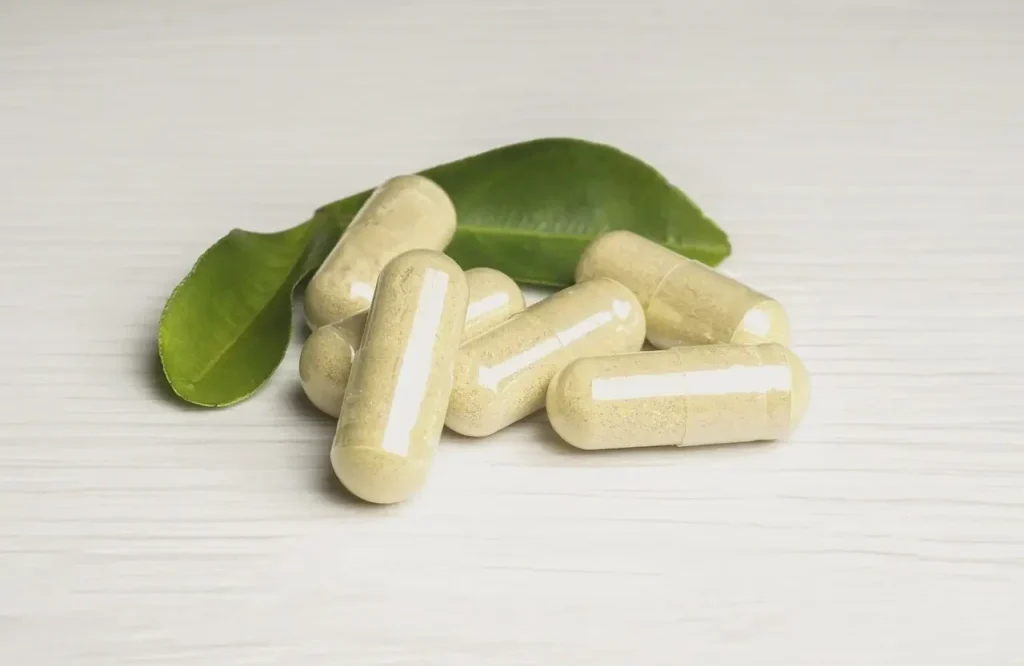Welcome to Supplements in Review’s guide on joint supplement ingredients! If you are interested in finding out what ingredients are effective and safe for a joint supplement, this guide will teach you about their benefits and usage—all backed by scientific references.
Joint supplements affect basic daily movement and comfort, having a massive impact on your overall quality of life. An increasing number of people have started taking advantage of their natural and safe benefits. Natural joint supplements can help you:
- Relieve pain, swelling, and inflammation
- Improve flexibility & mobility
- Enhance impact and shock absorption for healthier joints in the long run
- Protect, strengthen, and repair connective tissues
There is only one problem—there are many ineffective and downright scam supplements out there. How do you pick between the good and the bad? The answer often lies in the product’s ingredients and their dosages.
A joint supplement with research-backed ingredients in optimal amounts can improve your daily life no matter who you are. An athlete, an elderly person with osteoarthritis, or just an average person who wants to protect your joint health long-term.
Understanding what ingredients to look for and their optimal dosages should enable you to find a joint supplement that is ideal for your specific goals and situation.
Benefits of Glucosamine in Joint Supplements
Glucosamine is a naturally existing compound in your body. It helps to build and maintain cartilage, a rubbery tissue that cushions joints for smooth, frictionless movement.
As we get older, glucosamine levels go down. With it, cartilage starts breaking down too. This can lead to symptoms such as joint pain, stiffness, and increased joint inflammation.
Supplementing with glucosamine can help you in the following ways1:
- Support and repair cartilage. Glucosamine stimulates the making of key parts of cartilage, aiding in its regeneration.
- Reduce pain and stiffness. It encourages pain-free movement, especially in the cases of osteoarthritis.
- Improves mobility. By improving the health of your cartilage, glucosamine directly contributes to reducing friction between joints for smoother movement.
- Alleviates inflammation. Glucosamine also has mild anti-inflammatory properties, which may help to reduce joint swelling.
Adding glucosamine into your routine can be especially prudent if you started experiencing early symptoms of joint issues, or if you regularly do joint-straining exercises (like running of weightlifting).
Even if you don’t have any joint problems, glucosamine may serve as a protective measure against one developing later in life.
Optimal dosage: Between 1500-3000 mg of glucosamine sulfate per day.
How Chondroitin Improves Joint Health
Chondroitin is another key component of cartilage, skin, and bones in our body. It is often supplemented together with glucosamine.
One of chondroitin’s roles is helping to retain water in cartilage, which maintains cartilage’s elasticity and impact-absorbing qualities.
Coupled with its low risk of side effects, chondroitin’s benefits make it one of the most popular joint supplement ingredients alongside glucosamine. Other studied benefits of chondroitin include2:
- Maintains cartilage health. Not only does its water-retention properties keep cartilage flexible, but also resistant to compression, which protects your joints during movement and exercise.
- Repairs cartilage. Studies show that chondroitin slows cartilage degradation and promotes bodily processes that repair cartilage.
- Lowers pain. Regular supplementation of chondroitin is linked with joint pain reduction and improved mobility.
- Anti-inflammatory effects. Chondroitin has anti-inflammatory properties which helps to reduce accompanying joint swelling and pain.
Optimal dosage: 800-1200 mg of chondroitin sulfate per day.
Role of MSM in Joint Care Supplements
MSM, or methylsulfonylmethane, is an organic sulfur compound found naturally in our body, plants, and animals, but it can also be synthesized in a lab.
MSM has a list of studied benefits that make it one of the best joint supplements you can take. It relieves pain, reduces inflammation and swelling, improves flexibility, and supports long-term joint health and function.3
Here’s how MSM works:
- Blocks pro-inflammatory molecules. This includes pro-inflammatory cytokines and a protein known as NF-kB, which is aggravated in conditions like osteoarthritis. By inhibiting inflammation, MSM helps to relieve pain and swelling associated with it.
- Promotes optimal glutathione levels. Glutathione is a master antioxidant that protects your cells from damage. By promoting glutathione, MSM aids in protecting joint tissues from inflammation and breakdown.
- Aids cartilage preservation. MSM provides building blocks needed to form connective tissues, including cartilage. As such, supplementing MSM may delay or inhibit cartilage breakdown to an extent.
Apart from rare and mild gastrointestinal issues in sensitive people, MSM is generally linked with a very low risk of side effects.
Optimal dosage: 3,000 mg per day, with or without food.
Effects of Omega-3 Fatty Acids on Joints
Omega-3 fatty acids are crucial for joint health and recovery, especially EPA (eicosapentaenoic acid) and DHA (docosahexaenoic acid). These two omega-3s can be mainly found in fish and some plant oils, or they can be taken as a supplement—either fish oil or vegan algae oil.
Omega-3s are among the most effective general health supplements you can take, benefiting your cognitive function, mood, physical performance, athletic recovery, and joint health and function.4 Taking omega-3s daily can benefit your joints in the following ways:
- Reduced inflammation. Omega-3s inhibit pro-inflammatory cytokines and other molecules that aggravate joint swelling and pain.
- Immune system modulation. Omega-3s assist in taming an overractive immune system, reducing chronic inflammation that over time leads to joint deterioration.
- Cartilage protection. Omega-3s may help to reduce the breakdown of cartilage in osteoarthritis (OA), maintaining your joint function, comfort and flexibility.
- Relieves pain. Omega-3s may naturally alleviate joint pain and reduce the need for painkillers and NSAIDs.
Recommended dosage: For general health purposes, 1 g of combined EPA+DHA omega-3s per day. For more severe joint health issues, it is recommended to take 2-3 g of EPA+DHA per day. DO NOT take omega-3 supplements if you are on blood thinning medications, as the combination can increase the risk of bleeding.
Importance of Hyaluronic Acid in Joint Supplements
Hyaluronic acid is a name that may sound strange, but it is actually another naturally occuring molecule in your connective tissues and synovial fluid. It plays a role in pain management, joint lubrication, shock absorption, and cartilage health.5
Hyaluronic acid is one of the most effective joint health ingredients because:
- It lubricates the joint. Hyaluronic acid is found in synovial fluid which nourishes and lubricates the joint, ensuring smooth and comfortable movement during daily activities.
- It reduces inflammation. Hyaluronic acid has been shown to reduce inflammation and its associated symptoms like pain and joint swelling.
- It promotes cartilage health. Hyaluronic acid assists in delivering nutrients and lubricating fluid to cartilage, which promotes its repair and regeneration.
- It absorbs impacts. Due to its viscous nature, hyaluronic acid contributes to shock absorption from daily activities and intense exercise. It helps to evenly distribute pressure on the joint, reducing wear and tear.
Hyaluronic acid is generally seen as safe and with low risk of side effects. However, people who are on cancer treatments need to speak to their physician before taking hyaluronic acid, as it may protect and promote cancer cells in some situations.
Optimal dosage: 120 mg per day, with or without food.
Understanding the Action of Turmeric in Joint Supplements
Turmeric is an Indian spice known for containing the active compound curcumin. Curcumin is one of the most potent anti-inflammatory supplements available today.
Together with curcumin and other beneficial active compounds, turmeric makes for one of the most important joint supplement ingredients, thanks to its benefits6:
- Suppresses inflammation. Turmeric’s active compounds inhibit inflammatory factors like NF-kB, which reduces chronic inflammation and its associated joint health symptoms. Turmeric is shown to be similarly effective as pharmaceutical anti-inflammatory drugs (NSAIDs) in this regard.
- Antioxidant support. In addition to being a potent antioxidant itself, turmeric boosts your body’s native antioxidant defenses to protect your cells from damage. Thus, contributing to your long-term joint health.
- Pain relief. Studies show turmeric can be as effective as pain-relief drugs in some cases.
Curcumin should never be taken alone if your goal is reducing joint discomfort. This is because curcumin by itself is poorly absorbed and most of it stays in the gut (where it exerts anti-inflammatory effects).
For the purposes of improving gut health, this is not a bad scenario. However, if you want better joint health, make sure the turmeric supplement contains curcumin + black pepper extract. Black pepper contains piperine which substantially enhances curcumin’s absorption. Another method is to combine curcumin/turmeric with specialized lipids (a well-known patented brand which uses this method is called Meriva®).
Turmeric is generally shown as safe when taken in recommended dosages. However, people on blood thinners should consult their physician before using turmeric as the spice can act as a blood thinner itself, thus potentially increasing the risk of bleeding.
Optimal dosage: 500-1,500 mg of curcumin per day if taking with a black pepper extract, or 400-1,000 if taking a Meriva® formulation.
Efficacy of Green Tea Extract in Joint Wellness
Green tea extract is rich in polyphenols like epigallocatechin gallate (EGCG), which have potent antioxidant and anti-inflammatory properties that make them useful for many dietary products, joint supplements included.
Green tea can help your joints by7 8:
- Reducing inflammation. Green tea may reduce over-activity of the immune system, which potentially leads to less inflammation in the joints and diminished symptoms of arthritis.
- Protecting cartilage. Green tea may slow down osteoarthritis symptoms by reducing cartilage breakdown, promoting smooth and pain-free movement in exercise and daily activities.
- Providing antioxidants. Polyphenols in green tea protect your joint cells from oxidative stress and consequent damage.
- Relieving discomfort. Green tea’s antioxidant and anti-inflammatory properties are helpful in diminishing joint pain and swelling.
Generally, green tea extract is shown as safe when supplemented in studied amounts. Make sure to stick to product label instructions and never exceed them. In high doses, green tea extracts may exert side effects such as gastrointestinal upset and liver distress, although this is extremely rare.
Optimal dosage: A green tea extract containing 100-200 mg of EGCG per day.
Boswellia’s Contribution to Joint Supplement Effectiveness
Boswellia Serrata, or Indian Frankincese, is one of the most popular anti-inflammatory joint health ingredients due to its unique benefits9 10:
- Targeted anti-inflammatory action. Boswellia inhibits key enzymes such as 5-lipoxygenase which encourage the production of leukotrienes, which are mediators of inflammation.
- Supports cartilage health. Boswellia may help to protect cartilage from ravages of chronic inflammation.
- Improves mobility and flexibility. This is thanks to Boswellia’s pain-reduction properties.
Boswellia is generally seen as safe and with extremely low risk of major side effects.
Optimal dosage: 2400-3600 mg of Boswellia Serrata gum resin, or 100-250 mg if taking a patented Boswellia brand (e.g. 5-LoxinTM, AprèsFLEXTM).
Impact of Collagen on Joint Flexibility and Strength
Collagen is the most abundant protein in the body that plays a vital role in maintaining skin, bones, and joints among others. Type-II collagen, in particular, is shown to benefit cartilage and joint health when supplemented, offering the following benefits11:
- Reduced autoimmunity. Oral ingestion of Type-II collagen helps to reduce autoimmune reactions to the body’s own collagen, resulting in less joint inflammation in the case of arthritis.
- Supports joint tissue repair. Collagen’s cartilage-protective properties promote long-range joint health and function.
Collagen is one of the safest joint supplement ingredients available. The only small and rare risk is that it can increase oxalate production, which may in turn increase the risk of kidney stones in those who’re prone to developing them.
Optimal dosage: 10 g of hydrolyzed collagen per day for joint and skin health, or only 40 mg per day for managing osteoarthritis. In both cases, it’s best to take collagen on an empty stomach.
Exploring the Role of Gelatin in Joint Health
Gelatin is a flavorless collagen-derived protein. It is often used in soups, desserts, sauces, and some pharmaceutical drugs. Among many of its uses in supplements, gelatin is known to promote joint health.12 13
It offers two main benefits:
- Reduces joint pain. Gelatin is shown to have anti-inflammatory properties that contribute to all-around joint health and function.
- Strengthens connective tissues. Gelatin helps to increase cartilage density, which bolsters joint resistance to injuries and damage.
Gelatin supplements are seen as very safe. Like with all supplements, it is possible to experience upset stomach if you are sensitive, but this is rare.
Optimal dosage: 2-5 g per day, with or without food according to your tolerance.
Conclusion
Joint supplements can be a powerful ally in helping you to move free. Finding one that will give you results that you are looking for primarily depends on its ingredients. If you are not sure whether joint supplement benefits are right for you, I would suggest you to
Boswellia Serrata, omega-3s, green tea extract, curcumin, and hyaluronic acid are some of the best-studied ingredients for joint health. Taking either of these compounds alone can benefit you, but if you struggle with osteoarthritis, they work best when combined.
If you have any questions, please let me know down in the comments—I would like to hear from you!
References
- Williams C, Ampat G. Glucosamine Sulfate. [Updated 2023 Jul 22]. In: StatPearls [Internet]. Treasure Island (FL): StatPearls Publishing; 2024 Jan-. ↩︎
- Brito R, Costa D, Dias C, Cruz P, Barros P. Chondroitin Sulfate Supplements for Osteoarthritis: A Critical Review. Cureus. 2023 Jun 9;15(6):e40192. doi: 10.7759/cureus.40192. PMID: 37431333; PMCID: PMC10329866. ↩︎
- Butawan M, Benjamin RL, Bloomer RJ. Methylsulfonylmethane: Applications and Safety of a Novel Dietary Supplement. Nutrients. 2017 Mar 16;9(3):290. doi: 10.3390/nu9030290. PMID: 28300758; PMCID: PMC5372953. ↩︎
- Gammone MA, Riccioni G, Parrinello G, D’Orazio N. Omega-3 Polyunsaturated Fatty Acids: Benefits and Endpoints in Sport. Nutrients. 2018 Dec 27;11(1):46. doi: 10.3390/nu11010046. PMID: 30591639; PMCID: PMC6357022. ↩︎
- Walker K, Basehore BM, Goyal A, et al. Hyaluronic Acid. [Updated 2023 Jul 3]. In: StatPearls [Internet]. Treasure Island (FL): StatPearls Publishing; 2024 Jan- ↩︎
- Daily JW, Yang M, Park S. Efficacy of Turmeric Extracts and Curcumin for Alleviating the Symptoms of Joint Arthritis: A Systematic Review and Meta-Analysis of Randomized Clinical Trials. J Med Food. 2016 Aug;19(8):717-29. doi: 10.1089/jmf.2016.3705. PMID: 27533649; PMCID: PMC5003001. ↩︎
- Alghadir AH, Gabr SA, Al-Eisa ES. Green tea and exercise interventions as nondrug remedies in geriatric patients with rheumatoid arthritis. J Phys Ther Sci. 2016 Oct;28(10):2820-2829. doi: 10.1589/jpts.28.2820. Epub 2016 Oct 28. PMID: 27821943; PMCID: PMC5088134. ↩︎
- Luk HY, Appell C, Chyu MC, Chen CH, Wang CY, Yang RS, Shen CL. Impacts of Green Tea on Joint and Skeletal Muscle Health: Prospects of Translational Nutrition. Antioxidants (Basel). 2020 Oct 28;9(11):1050. doi: 10.3390/antiox9111050. PMID: 33126483; PMCID: PMC7692648. ↩︎
- Pérez-Piñero S, Muñoz-Carrillo JC, Victoria-Montesinos D, García-Muñoz AM, Andreu-Caravaca L, Gómez M, Schölzel M, García-Guillén AI, López-Román FJ. Efficacy of Boswellia serrataExtract and/or an Omega-3-Based Product for Improving Pain and Function in People Older Than 40 Years with Persistent Knee Pain: A Randomized Double-Blind Controlled Clinical Trial. Nutrients. 2023 Sep 3;15(17):3848. doi: 10.3390/nu15173848. PMID: 37686880; PMCID: PMC10490338. ↩︎
- Siddiqui MZ. Boswellia serrata, a potential antiinflammatory agent: an overview. Indian J Pharm Sci. 2011 May;73(3):255-61. doi: 10.4103/0250-474X.93507. PMID: 22457547; PMCID: PMC3309643. ↩︎
- Martínez-Puig D, Costa-Larrión E, Rubio-Rodríguez N, Gálvez-Martín P. Collagen Supplementation for Joint Health: The Link between Composition and Scientific Knowledge. Nutrients. 2023 Mar 8;15(6):1332. doi: 10.3390/nu15061332. PMID: 36986062; PMCID: PMC10058045. ↩︎
- Shaw G, Lee-Barthel A, Ross ML, Wang B, Baar K. Vitamin C-enriched gelatin supplementation before intermittent activity augments collagen synthesis. Am J Clin Nutr. 2017 Jan;105(1):136-143. doi: 10.3945/ajcn.116.138594. Epub 2016 Nov 16. PMID: 27852613; PMCID: PMC5183725. ↩︎
- Vassallo V, Tsianaka A, Alessio N, Grübel J, Cammarota M, Tovar GEM, Southan A, Schiraldi C. Evaluation of novel biomaterials for cartilage regeneration based on gelatin methacryloyl interpenetrated with extractive chondroitin sulfate or unsulfated biotechnological chondroitin. J Biomed Mater Res A. 2022 Jun;110(6):1210-1223. doi: 10.1002/jbm.a.37364. Epub 2022 Jan 28. PMID: 35088923; PMCID: PMC9306773. ↩︎



Leave a Reply